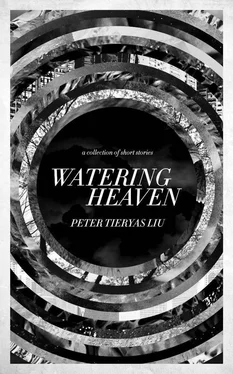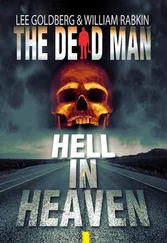Still, production commenced. There were questions like what type of camera to use, which locations to secure permits and which locations to guerilla-style it. These were the unique travails of indie film productions rife with the exhilaration of dealing with unpredictable caprice that tore apart even the best of planning. It was a twenty-day shoot through rain and sunshine and early mornings and sleepless nights and groggy food marches. The range of deaths was diverse: severed heads, sundered intestines, rent rectums, and spliced spinal cords, the corsage of a conundrum with the punch line of emptiness. It was the dismal conviction of a life that had been unkind to a dreamer.
On the day of the wrap party, Larry got stuck in traffic. At the exact same time, a fourteen-year-old teenager was assigned the task of shooting a random person as initiation for the gang he wanted to join. He shot Larry five times in the head while humming a catchy pop song. Larry, who’d been humming Billy Joel, didn’t see what was coming and died on the spot.
The news spread like a wildfire, the conflagration of curiosity razing the public. Larry Chao had shown in his own film the method by which he would die days before he actually did, a ghastly prognostication on the stem of his being. Many viewed it as a condemnation of a society that beautified whimsical violence and sought purpose in perdition. All of a sudden, everyone wanted to see his movie. Motivated by the ardorous obsession of the zealot and the grisly curiosity of the scientist dissecting a live human and noting his death throes as observational bullet points, they waited in interminable lines and slept in front of theaters overnight to catch the matinee. The notoriety of a dog death had garnered him something that had eluded him throughout his breathing life. Interest. 58 Random Deaths and Unrequited Love was deemed a masterpiece by the critics. It won most of the major awards at the important film festivals and he was heralded as an auteur unparalleled in scope and vision. When it was revealed that he had archives of unseen films, they were immediately sought out and distributed. All of a sudden, the only name that seemed relevant in film was Larry Chao. Which seemed especially poignant when one considered that the title of the movie that seemed to connote every emotion Chao must have felt being six feet underground as a rotting corpse was his first: Posthumous Fame: What’s the Point of Being Recognized after Death?
I’m inside an abandoned shopping mall and a hooker’s chasing me with a kitchen knife. It’s 6 a.m. Goddamn Martin for getting me into this shit.
Would you believe me if I told you he was a nervous wreck around girls? Perpetual stutter, tics skirting across his face, legs shaking like rattles on a rattlesnake. He was the really nice, quiet guy at work, not the guy who was going to start a sex cult and get me killed.
There was that one late night when he said, “Is any of this shit worth a damn?”
“Course it is.”
“We’re testing computerized Playmates so they can lay off card dealers in Vegas,” he said.
“I don’t mind staring at Playmates all day.”
He sighed. “We’ve made it too easy to ignore our conscience.”
Martin’s parents were poor farmers in rural China. They passed away when he was young, so an uncle heading to America agreed to raise him. I met him twenty-three years later at the LA branch of SolTech Industries where we both did quality assurance for whatever new machines they were developing to replace jobs in America.
He had brown eyes, a pale face, a fastidious bowl cut. We were buddies five years and must have had eighteen different bosses during that time. Every one of them was a schmuck. Some were nicer than others, with nicer meaning better bullshitter .
Martin and I bitched about girls who rejected us and the cheap pizzas they brought in at work to excuse making us work free overtime. I felt guilty about testing software meant to replace school teachers, and Martin hated the whole ‘digitized friend’ trend that had gripped the States. The concept was simple. Most of our friendships are already digitized: digital calls, emails, links. Just take that to the next level and actualize the digitalization so that lonely manic depressives can pay money for pseudo-friendships.
It bothered Martin that this corporation preyed on the mentally ill, forming alliances and sponsorships with various psychological associations. “No one gives a shit,” he said, then quit. Though they found his replacement literally five minutes later, everyone at work was stunned. My supervisor summed it up best: “Who quits a job over moral compunctions?”
I took him out for drinks. As usual, rejections were manifold. Most of these tall, lithe women with short skirts and gazelle legs wouldn’t even look my way. Martin laughed at my ass. “You need to work on your pick up lines.”
“I think it has more to do with my looks than my delivery… your turn. Go talk to that Chinese girl over there.”
“Right now?”
“Dude!”
Martin approached her, orbiting, hovering. I saw him make a few attempts at conversation but she didn’t hear him over the loud music. Eventually when she did notice, she gave an indifferent glance and walked away with her friends.
I laughed.
“Thanks,” he muttered dryly.
I put my arm around his shoulder and toasted him. “To losers.”
“Losers.”
“Where you going to find work?” I asked. “It’s hard as hell to get QA jobs right now.”
He shrugged. “I don’t have to work. I never told you I got a quarterly stipend?”
“For what?”
“Donating my blood.”
“You need more than twenty bucks a month to survive.”
“What about fifteen thousand every four months?”
I nearly spat out my beer. “Fifteen thousand bucks to donate your blood?”
He grinned. “I have a special type.”
“What kind?”
“It’s HIV-resistant.”
If I hadn’t been so drunk, I’d probably remember his explanation better. Human Immunodeficiency Virus, or HIV for short, could destroy your immune system, breaking down all the barriers that kept you safe, increasing apoptosis rates or executing the cells outright. Call it the Genghis Khan of cellular biology: it was fucking ruthless. Martin’s resistance had something to do with cytotoxic T-lymphocytes and immunoglobulin A, a rarity that made him a valuable specimen for biotech companies trying to discover the vaccine for HIV.
Next morning, I didn’t hear from him. A week passed, a month. He’d vanished. Cell phone disconnected. Apartment abandoned. Email box overloaded.
The next six months were brutal at work: two rounds of layoffs, me acting like a fucking mendicant, lucky to keep my job, my boss lording it over us like he was a duke. My life was a penitentiary, a prison cell of wanting useless shit and having to please my unpleasable supervisors, who smugly pretended they were on our side. ‘How do you think these layoffs make me feel?’ they loved to ask.
One night, I got a late phone call. “You been trying to reach me, Walt?”
“Martin?”
“Come and visit me.”
“Where are you?”
I’d heard about the shanty towns forming outside of major cities throughout America. I headed towards one about two hours east of Los Angeles. The building I was supposed to go to had been a shopping mall until the housing crisis hit and the real estate in the area plummeted 1700 %. A booming slice of suburbia became a derelict ghost town, complete with tumbleweed and dusty roads. A musty, putrid smell oozed out of melted concrete and dank wool that had dried. The mall was enormous, faded logos and outlet signs that were falling apart. The parking lot resembled a landfill and my car, being the jalopy it was, blended right in.
Читать дальше












